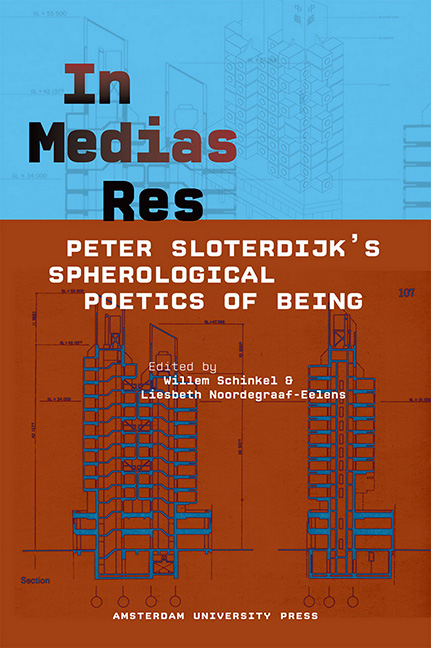Book contents
- Frontmatter
- Contents
- 1 Peter Sloterdijk’s Spherological Acrobatics: An Exercise in Introduction
- 2 Foamy Business: On the Organizational Politics of Atmospheres
- 3 “Transgenous Philosophy”: Post-humanism, Anthropotechnics and the Poetics of Natal Difference
- 4 Disinhibition, Subjectivity and Pride. Or: Guess Who Is Looking?: Peter Sloterdijk’s reconstruction of ‘thymotic’ qualities, psychoanalysis and the question of spectatorship
- 5 Sloterdijk and the Question of an Aesthetic
- 6 Uneasy Places. Monotheism, Christianity, and the Dynamic of the Unlikely in Sloterdijk’s Work – Context and Debate
- 7 The Attention Regime: On Mass Media and the Information Society
- 8 In the Beginning was the Accident: The Crystal Palace as a Cultural Catastrophe and the Emergence of the Cosmic Misfit: A critical approach to Peter Sloterdijk’s Weltinnenraum des Kapitals vs. Fyodor M. Dostoevsky’s Notes from the underground
- 9 A Cautious Prometheus? A Few Steps Toward a Philosophy of Design with Special Attention to Peter Sloterdijk
- 10 Sloterdijk and the Question of Action
- 11 The Space of Global Capitalism and its Imaginary Imperialism: An Interview with Peter Sloterdijk
- Contributors
- Index
In a Map of Time
Published online by Cambridge University Press: 23 June 2021
- Frontmatter
- Contents
- 1 Peter Sloterdijk’s Spherological Acrobatics: An Exercise in Introduction
- 2 Foamy Business: On the Organizational Politics of Atmospheres
- 3 “Transgenous Philosophy”: Post-humanism, Anthropotechnics and the Poetics of Natal Difference
- 4 Disinhibition, Subjectivity and Pride. Or: Guess Who Is Looking?: Peter Sloterdijk’s reconstruction of ‘thymotic’ qualities, psychoanalysis and the question of spectatorship
- 5 Sloterdijk and the Question of an Aesthetic
- 6 Uneasy Places. Monotheism, Christianity, and the Dynamic of the Unlikely in Sloterdijk’s Work – Context and Debate
- 7 The Attention Regime: On Mass Media and the Information Society
- 8 In the Beginning was the Accident: The Crystal Palace as a Cultural Catastrophe and the Emergence of the Cosmic Misfit: A critical approach to Peter Sloterdijk’s Weltinnenraum des Kapitals vs. Fyodor M. Dostoevsky’s Notes from the underground
- 9 A Cautious Prometheus? A Few Steps Toward a Philosophy of Design with Special Attention to Peter Sloterdijk
- 10 Sloterdijk and the Question of Action
- 11 The Space of Global Capitalism and its Imaginary Imperialism: An Interview with Peter Sloterdijk
- Contributors
- Index
Summary
Whilst on the flowing yellow train, smoothly crossing the border between Germany and the Netherlands, I am not surprised at hearing a tender voice from deep within me, and experiencing the joy it evokes. My friends are surprised when, upon arrival at Utrecht Centraal Station, they hear me sighing: “Thanks, I am glad to be back.”
Over the past eighteen years, I have strayed and roamed across half of my native country. Yet, to my surprise, the one place that really touched me, that had me promise to return, is none other than Utrecht. Perhaps it is because particularly there, I have not only touched her countless veins in turquoise green, and heard the lullaby of sheep in my slumbers, but I also found my own dream, the one I have been dreaming ever since I was a naive little child, the one I will keep on dreaming, until my hair turns grey – a dream about peace, love, and home.
Before July finally arrived, I spent a month online, searching for information, planning my trip, memorizing texts about my upcoming classes, so as to paint a picture of the Netherlands, a legend that I was about to encounter. However, as soon as I found myself in her embrace, all the images in my mind turned out to be too blank, too shallow to draw a real picture of her face.
04.00 AM, July 5th. Although upon arrival everyone was tired after flying for 12 hours, we excitedly exchanged our first impressions, in delightful whispers, afraid of breaking the tranquility of this country, which was still half asleep and half awake. On the bus from Amsterdam to Utrecht, I gave up grasping my camera. No matter how advanced the technology, life itself can never be fully caught by artificial instruments. To describe the sheep and cows, strolling in the fields, separated by clear and clean rivulets rather than by barbed wire or fences, peace itself is not too strong a word.
I am aware that what was so impressive to me is just daily life for the Dutch.
- Type
- Chapter
- Information
- In Medias ResPeter Sloterdijk's Spherological Poetics of Being, pp. 80 - 84Publisher: Amsterdam University PressPrint publication year: 2012



